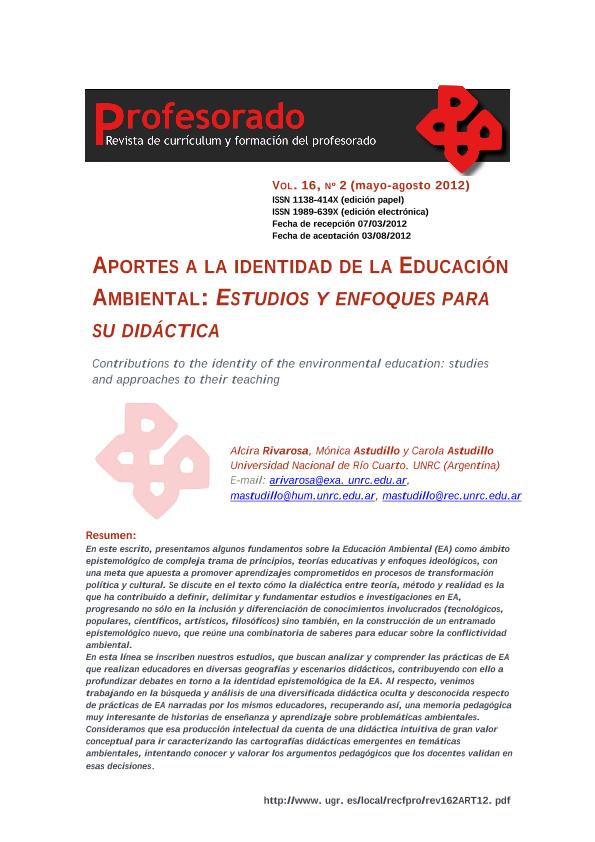Artículo
En este escrito, presentamos algunos fundamentos sobre la Educación Ambiental (EA) como ámbito epistemológico de compleja trama de Principios, teorías educativas y enfoques ideológicos, con una meta que apuesta a promover aprendizajes comprometidos en procesos de Transformación política y cultural. Se discute en el texto cómo la dialéctica entre teoría, método y realidad es la que ha contribuido a definir, delimitar y fundamentar estudios e investigaciones en EA, progresando no sólo en la inclusión y diferenciación de conocimientos involucrados (tecnológicos, populares, científicos, artísticos, filosóficos) sino también, en la construcción de un entramado epistemológico nuevo, que reúne una combinatoria de saberes para educar sobre la conflictividad ambiental. En esta línea se inscriben nuestros estudios, que buscan analizar y comprender las prácticas de EA que realizan educadores en diversas geografías y escenarios didácticos, contribuyendo con ello a profundizar debates en torno a la identidad epistemológica de la EA. Al respecto, venimos trabajando en la búsqueda y análisis de una diversificada didáctica oculta y desconocida respecto de prácticas de EA narradas por los mismos educadores, recuperando así, una memoria Pedagógica muy interesante de historias de enseñanza y aprendizaje sobre problemáticas ambientales. Consideramos que esa producción intelectual da cuenta de una didáctica intuitiva de gran valor conceptual para ir caracterizando las cartografías didácticas emergentes en temáticas ambientales, intentando conocer y valorar los argumentos pedagógicos que los docentes validan en esas decisiones. In this paper, we present some basics on Environmental Education (EE) as an epistemological field of a complex network of principles, education theories and ideological approaches, and which has a goal committed to promoting learning processes involved in cultural and political transformation. The paper discusses how the dialect between theory, method and reality is what has helped to define, identify and inform studies and research in EE, processing not only in the inclusion and differentiation of knowledge involved (technological, popular, scientific, artistic, philosophical) but also in the construction of a new epistemological framework, which includes a series of knowledge to educate on environmental conflict. Our studies follow this line and seek to analyze and understand the practices of educators conducting EE in different places and educational settings, contributing to further discussion about the epistemological identity of EE. In this regard, we have been working in the search and analysis of a diverse ‘hidden and unknown pedagogy’ in relation to situated EE; thus recovering a memory of interesting learning-teaching practices about environmental issues. We believe that such intellectual production is a valuable conceptual input to characterize emerging teaching situations in environmental issues, challenging the educational arguments that teachers validate in their decisions. Considering these premises, this paper will develop three central issues. 1) strains and theoretical assumptions on EE (why and how to educate about the environment?); 2) criteria built for the formation of environmental educators and the analysis of their EE practices (what do they do and/or what do educators say they do?); and 3) basic conceptual nuclei/cores that make it possible to rethink the dimensions and approaches that define those innovative practices in environmental education (what should an environmental educator know and what should he be able to do?).
Aportes a la identidad de la Educación Ambiental: Estudios y enfoques para su didáctica
Título:
Contributions to the identity of the environmental education: studies and approaches to their teaching
Fecha de publicación:
08/2012
Editorial:
Universidad de Granada. Facultad de Ciencias de la Educación
Revista:
Profesorado
ISSN:
1138-414X
Idioma:
Español
Tipo de recurso:
Artículo publicado
Clasificación temática:
Resumen
Palabras clave:
EDUCACION AMBIENTAL
,
IDENTIDAD EPISTEMOLÓGICA
,
COREOGRAFIAS DIDÁCTICAS
Archivos asociados
Licencia
Identificadores
Colecciones
Articulos(CCT - CORDOBA)
Articulos de CTRO.CIENTIFICO TECNOL.CONICET - CORDOBA
Articulos de CTRO.CIENTIFICO TECNOL.CONICET - CORDOBA
Citación
Rivarosa, Alcira Susana; Astudillo, Mónica Isabel; Astudillo, Carola Soledad; Aportes a la identidad de la Educación Ambiental: Estudios y enfoques para su didáctica; Universidad de Granada. Facultad de Ciencias de la Educación; Profesorado; 16; 2; 8-2012; 239-260
Compartir




